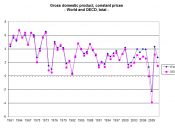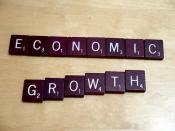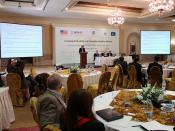Effects of economic growth:
Living standards:
Faster economic growth results in an increase in real GDP per capita. Real wages can rise & households can enjoy a higher disposable income & therefore higher material standards eg. faster economic growth in Australia resulted in 3.0% annual growth in per capita real incomes in the decade 2003 compared to 1.4% in the 1980s
Employment:
Economic growth creates jobs & a strong enough level of economic growth can help to ensure that everyone who is willing and able to find work is able to find employment; also changes the nature of the jobs available (more highly paid, higher skilled jobs)
Inflation:
Higher economic growth, higher prices & larger wage claims ie. higher inflation.
Especially the case if spending is growing when the economy is close to its full capacity & growth in aggregate supply cannot keep up with growth in aggregate demand.
Government aims to keep growth at a level that is not so high that it prompts a surge in inflation - 'sustainable rate of economic growth'
External stability:
Stronger economic growth in Australia is often associated with increased consumer & business spending, and as a result, higher levels of imports.
Australian consumers spend a high proportion of their disposable income on imported G&S = rise in CAD ie. poses risk to the external stability of the economy
Income distribution:
Although it is thought that higher economic growth contributes to higher living standards, it often only benefits a particular group of people such as shareholders or company executives (higher income earners), rather than flowing more broadly to people through wage increases or improved public services.
Environmental impacts:
If growth is pursued with little regard to its impact on the environment, it can result in pollution, depletion of non-renewable energy resources and...


